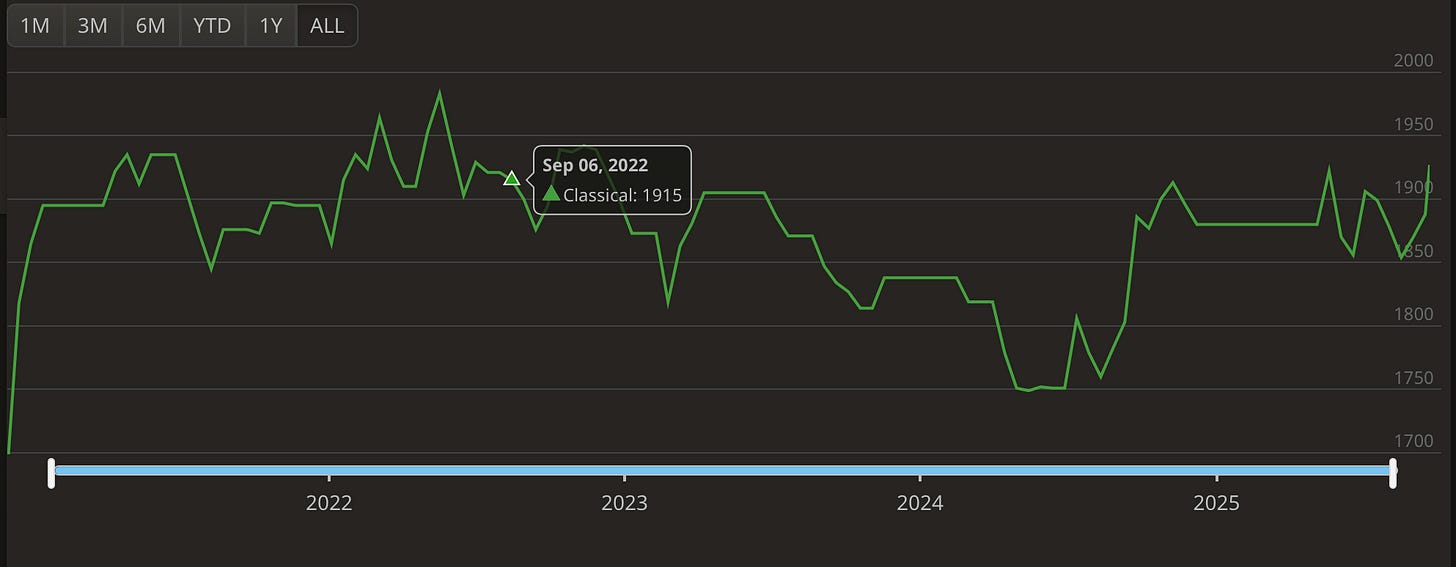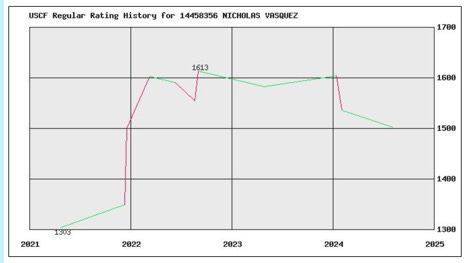Clearing the Fog
Years after a mental fog set in, suddenly it seems to have cleared
Welcome back to Chess in Small Doses, a Substack about adult improvers and chess. Last time I wrote about the impact I had seen after changing my training to focus on basic, simple tactics. That wasn’t the only change I made however and since the publication of that piece, I have felt more mental clarity than I had in years. My wife helped me notice a few other changes I had made and it occurred to me that they might help other adults to improve, especially older players (over 45). There is a real power in consistent training done slowly and deliberately. However that pales in comparison to consistent sleep, exercise, and good diet. Lastly, older players should strongly consider supplementing with creatine. These things can really help clear the mental fog. Let’s get into it.
The Before
I’m not sure if you can relate, but around the time I turned 50 I felt a mental fog settle in. I started getting serious at chess around age 47 and things were difficult at first because it was new, but soon I could see things quickly. My mind worked fast, sometimes too fast causing me to make careless errors. That’s a doctor for you, “sometimes wrong, but never in doubt.” As you may know I am an ER doc by profession. This means I have strange hours, inconsistent sleep, and significant work stress. I have gotten used to having multiple days of short sleep every month. I found that exercise and caffeine really helped deal with that. For the last 15 years I have consistently exercised to process work stress. Coffee is my drink of choice, with 2-6 cups a day being part of my normal experience. These habits meant I could get by and perform well including at chess.
However a few years later in 2022 I turned 50 and things began to feel less clear mentally. It felt like I was thinking through a fog more and more. It was harder to process the same information suddenly. I was still exercising consistently and using caffeine to deal with sleep deprivation, but it wasn’t working the same. This was annoying because it began to affect my chess and my mood. Over the last 3 years, I settled into a range of 1800-1900 Lichess Classical and about 1500-1600 USCF. It’s more accurate to say I started out 1900’s Lichess and 1600 USCF and have lost ground ever since. Even though rating conversion is difficult, the Lichess rating minus 300 points roughly gets you to your approximate USCF rating. So at least I’m consistent between the two.
Here’s my rating graphs for both Lichess Classical and USCF rating.
Recently I played in the Lichess 45/45 league again for Season 44, running from May to June this year. I played 6 games and scored 3/6 with a performance rating of 1876 Lichess. My lifetime score over 83 league games since 2022 is 42.5/83 with a performance rating of 1861 Lichess. The more things change, the more they stay the same I felt. This was really kind of depressing to me. I have put in a lot of time in deliberate practice over the last 3 years. The lack of progress was, to be honest, part of the reason for the training changes to focus on basic tactics. After I wrote about Jacob Aaggard’s advice in April, I began to really question my training methods given the consistent advice he had given over multiple podcasts, interviews, and books. Who was I to challenge his experience? Besides, what did I have to lose?
The Intervention
So I made a few changes after re-reading the book Atomic Habits in May. I was inspired by the ideas of habit stacking, but also of eliminating some habits by making them more difficult. I took an honest assessment of where I was in May in chess and other important areas of my life and then implemented some changes. Most of those changes took place in June. Some of them were chess related, and some were not. I believe they all had an impact on my chess.
First, I made the change to train slowly and deliberately on basic tactics. I went into much more detail in the last post on my training methods. Aaggard mentioned the need to “slow down” and “control your thinking” when doing training. This really dovetailed with the lessons from Atomic Habits. Changes in identity are more lasting and impactful than changes in habits alone. I wanted to be the kind of player who considered the impact of a move, who was disciplined in their thought process, and chose a move having at least thought through the opponent’s best reply. This doesn’t come automatically unless it’s trained repeatedly. I started to apply that approach to my games, my analysis, and my thinking. It is not a quick change and is still a work in progress, but it helped clarify where I wanted to go. Better a direction than a destination I was thinking. Everything I do now for chess I try to do slowly and deliberately.
Secondly, I made diet changes and stopped eating sugar at work. I have to admit that I ate like crap sometime. Many hospital based doctors do, but that’s because we have so many demands on our time and so many options to just grab and go. Fresh food is harder to find, processed food is abundant, and there’s never a shortage of sugary snacks, desert, and caffeine. It may keep us going when we’d rather stop but it comes at a cost and causes inflammation in the body. Numerous studies have shown that excess sugar negatively impacts cognitive function. Studies of diabetics clearly show depressed cognitive performance during episodes of high blood sugar. This appears to be especially true for middle aged or older adults, of which I am one.
I had found it just too easy to grab some cookies or an ice cream sandwich when stressed at work. Habits aren’t always well thought out, but are often based upon immediacy of reward. Before I made the habit change, I was grabbing candy bars or ice cream every shift. It was an issue. I wanted to be healthier and was tired of the dad bod I was carrying around. Over the last 2 months, I have greatly reduced the amount of refined sugar I consume each week by instead eating high protein snacks. Credit goes to my wife for bringing the dietary changes to my attention as a possible cause of improved play.
Lastly, I began to take a daily supplement of 5-10gm of creatine monohydrate. The science behind creatine is fascinating. If you’re really curious let me recommend this summary page and this video from Dr. Rhonda Patrick who goes deeply into the benefits of creatine. The primary benefit is that it helps blunt the cognitive impact of sleep deprivation (which is equivalent to being drunk). As an ER doc, my sleep will never be normal and self interest was what first motivated me. Regarding creatine and sleep deprivation, the journal Nature published a study that showed an amazing result. The study showed that a single (high) dose of creatine was capable of reversing the negative impact sleep deprivation (like 3 hours of sleep over 24 hours). The take away quote is: “These outcomes suggest that a high single dose of creatine can partially reverse metabolic alterations and fatigue-related cognitive deterioration.” The interesting side note if you read the paper is creatine seemed to improve people’s performance on cognitive tests compared to their baseline on a full nights rest!
However surprisingly creatine also seems to help improve cognitive function in older adults (>40years). At least that seems to be the message from this systematic review of the cognitive benefits of creatine supplementation. “Generally, there was evidence that short term memory and intelligence/reasoning may be improved by creatine administration.” The interesting thing I noticed in this review is that the benefits of creatine supplementation were more pronounced in older individuals and vegetarians, and not so much for younger individuals. Age related reduction in brain energy is one reason many adults have slower performance on cognitive testing compared to their younger selves. I’m pretty sure that happened to me at 50. The benefit of supplementing creatine for neurons seems similar to what it does for muscle cells, which is improving cellular energy production and therefore improving the brain’s performance. For all of those reasons and more, I chose to start taking it after listening to Rhonda Patrick’s podcast on it.
The After
After I finished with the 45/45 league season in June, I played in the Lonewolf league. Lonewolf is a large Swiss tournament that goes on for about 11 weeks with two divisions: u1800 and Open. I played in the Open Section, which meant if I won I’d potentially face much higher rated players (something not true with the 45/45 league). I only played in the last 5 games of the season only, mostly to avoid the overlap between 45/45 and Lonewolf seasons. My Lonewolf games were played between July 11th and August 11th, coming after the changes I mentioned. Also I resumed playing OTB in August. I found a Tuesday night USCF rated tournament that plays one round per week, game 90+30.
In those 5 Lonewolf games I went 3/4 (removing 1 forfeit due to no-show) with a performance rating of Lichess 2255, almost 400 points higher than my average! This included wins against players rated Lichess 1976, 2035, and 2198 (my highest rated win ever)! I’ve played two OTB games so far against higher rated opponents (USCF 1676 and 1785) and have scored 1.5/2 for a performance rating of USCF 1932 so far. A small sample size to be sure, but a real improvement!
Aside from the hard data, there is the subjective. I think the most important thing I can tell you is that I have felt sharp again. I feel a mental clarity over the board that I haven’t felt for years. Much of chess performance can depend on confidence and attitude, not just talent. Over the last two months not only can I see the tactics easier, but I feel sharper and faster mentally. Previously I always felt like I needed coffee during games, but lately I’ve felt more awake and present. I ’m not sure if it’s illusion or real, but the data would suggest something has changed.
Signal vs Noise
It’s impossible for me to say which one of these changes was responsible for the mental clarity. Regular exercise, a healthy diet, and quality sleep are the mainstays of good cognitive performance. No supplement can make up for a lack of exercise, and no exercise program can overcome a bad diet. Sleep is a basic human need, and I advise getting enough quality sleep as frequently as you can. For most players, if you haven’t included these three things as part of your life these are the low hanging fruits you can pick. It’s likely that dietary changes alone improved my cognitive function. Reduced sugar intake has meant I feel better and, in my opinion, I’m thinking clearer. I suspect this would work similarly for other players as well.
Obviously I believe the training changes have helped me greatly. Focusing on training basic tactical patterns in a slow and deliberate manner made them easier to see in my opinion. I felt the impact of the training almost immediately after I changed to daily sessions of about 20-25 min. The counter argument is that I’ve been doing deliberate practice for 5 years on tactics. Personally I believe that Aaggard (and others) is right and anyone < 1800 FIDE(1900 USCF) should probably just focus heavily on basic tactics and leave the rest alone. Having done so appears to have made a big impact on my chess performance.
The science behind creatine is too tantalizing to ignore. Especially for older adults and vegans/vegetarians (who do not eat meat, the dietary source of creatine) supplementing creatine appears to have a clear cognitive benefit. What I think adult improvers should understand is that while the science is still growing , the evidence clearly suggests one thing: “ Older adults may experience greater cognitive benefits from creatine due to age-related declines in brain energy metabolism.” If you’re over the age of 45 and playing chess, consider adding creatine daily.
It’s been a revelation to experience this clarity again. Nothing can stop age related changes, but they can be slowed or greatly delayed by healthy habits. Now that I understand the connections between my habits and my performance, it will be impossible to go back. I am excited to play more OTB games and the next season of Lonewolf. I want to see where this story goes.
Thank you for reading. I’d love to hear your experience if you’ve done anything similar. I am curious if other adult improvers over the age of 45 would get a similar benefit. I certainly hope so.





Regarding creatine, the study you refer to says that subjects were given 0.35g of creatine per kg. However you say you're consuming just 5-10mg per day? Didn't you mean grams?
Well written Nick! Fun fact when I accompanied the English team at the Chennai 2022 Olympiad, I brought creatin in my suitcase to give the players. Three years later it's a mainstay in pro esports which are a lot more advanced than chess for that sort of things.